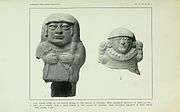Anthony F. C. Wallace
| Anthony F. C. Wallace | |
|---|---|
| Born |
April 15, 1923 Toronto, Ontario, Canada |
| Died |
October 5, 2015 (aged 92) Ridley Park, Pennsylvania, United States |
| Alma mater | University of Pennsylvania |
| Awards |
Cornplanter Medal (1970), Lifetime Achievement by the Society for Psychological Anthropology (2013) |
| Scientific career | |
| Fields | Anthropology |
| Institutions | Eastern Pennsylvania Psychiatric Institute |
Anthony Francis Clarke Wallace (April 15, 1923 – October 5, 2015) was a Canadian-American anthropologist who specialized in Native American cultures, especially the Iroquois. His research expressed an interest in the intersection of cultural anthropology and psychology. He was famous for the theory of revitalization movements.[1]
He was born in Toronto, Ontario, in 1923, the son of the historian Paul Wallace, and did both undergraduate and graduate work at the University of Pennsylvania, where he was a student of A. Irving Hallowell and Frank Speck. He received his Ph.D. in 1950. He later taught at the University of Pennsylvania, where his students included the anthropologist Raymond D. Fogelson and anthropologist/folklorist Richard Bauman.
He was also for a time the Director of Clinical Research at the Eastern Pennsylvania Psychiatric Institute.
He died on October 5, 2015, in Ridley Park, Pennsylvania, where he had been residing.[2]
Works
- (1949) King of the Delawares: Teedyuscung 1700-1763
- (1952) The Modal Personality Structure of the Tuscarora Indians, as Revealed by the Rorschach Test. Washington: U.S. Government Printing Office.
- (1961) Culture and Personality. New York: Random House. and 1970
- (1966) Religion: An Anthropological View.
- (1969) The Death and Rebirth of the Seneca. New York: Random House
- (1978) Rockdale: The growth of an American village in the early industrial revolution. New York: Alfred A. Knopf.
- (1982) The Social Context of Innovation. Princeton University Press
- (1987) Saint Clair: a Nineteenth Century Coal Town's Experience with a Disaster-Prone Industry. New York: Random House
- (1988) with corrections as paperback: Cornell University Press, Ithaca and London ISBN 0-8014-9900-3 LCCN n/88/4772
- (1993) "The Long, Bitter Trail." New York: Hill and Wang
- (1999) "Jefferson and the Indians: The Tragic Fate of the First Americans." Cambridge, MA: Belknap/Harvard
- (2012) Tuscarora: A History. Albany, NY:SUNY Press
- (2013, December) "Commentary: 'Growing Up Indian': Childhood and the Survival of Nations." Ethos (Journal of the Society for Psychological Anthropology) Volume 41(4):pp. 337–340.
References
- ↑ Encyclopædia Britannica, inc (1998). The New Encyclopædia Britannica - Volume 8; Volume 12 (15 ed.). Encyclopædia Britannica. ISBN 0852296339.
- ↑ "Anthony F. C. Wallace". Legacy.com. Retrieved January 14, 2016.
Sources
- Darnell, Regna (2006) "Keeping the Faith: A Legacy of Native American Ethnography, Ethnohistory, and Psychology." In: New Perspectives on Native North America: Cultures, Histories, and Representations, ed. by Sergei A. Kan and Pauline Turner Strong, pp. 3–16. Lincoln: University of Nebraska Press.
- Kan, Sergei A., and Pauline Turner Strong (2006) Introduction. In: New Perspectives on Native North America: Cultures, Histories, and Representations, pp. xi-xlii. Lincoln: University of Nebraska Press.
External links
